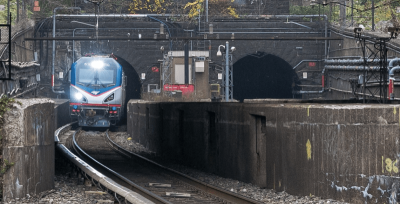‘Dear Colleague’: Biden Throws Trump Under the Bus and Supports Transit Funding, Gateway

“Dear colleague: So much for the Trump administration’s transit BS.”
The Federal Transit Administration on Tuesday rescinded a three-year-old Trump administration policy that effectively blocked the vital Gateway project on the grounds that it didn’t have sufficient local funding to meet federal grant standards — a policy that was bitterly opposed by local officials and Gateway boosters (and was probably illegal).
The critical switcheroo came in the form of a “Dear Colleague” letter quietly posted on the FTA website on Tuesday. The letter doesn’t say much except that “effective immediately, the Federal Transit Administration is rescinding the ‘Dear Colleague’ letter on the Capital Investment Grants program issued by the FTA Acting Administrator on June 29, 2018,” and that the Biden-era FTA will “rely on the statutory framework to ensure proposed projects have met the requirements of federal public transportation law, the regulation (the Major Capital Investment Projects Final Rule), and the CIG Final Interim Policy Guidance published in June, 2016.”
What does that all that federal language mean? Well, the Trump Administration letter explained that the FTA would no longer consider federal loans as part of a state’s portion of the funding for big ticket projects — even though any federal loans would be paid back by local taxpayers. The Trump FTA considered federal loans as part “of all federal funding sources … and not as separate from the Federal funding sources.”
Officials such as Sen. Chuck Schumer blasted that guidance, which led to Gateway being rated poorly by federal transit regulators.
Tuesday’s letter, signed by FTA Acting Administrator Nuria Fernandez, goes back to what many believe was the original congressional intent of the Capital Investment Grants program — namely that if state taxpayers are holding the bag for a federal loan, that money should count towards the local share of a project. Not only Gateway was stalled, as Streetsblog reported at the time. In fiscal year 2018, for example, the Trump Administration allocated only half of the transit grant money that congress had allocated.
The real goal of the administration was to make it harder for transit agencies to get funding so that such money could be diverted to highways, according to reporting by The Architect’s Newspaper.
“Today’s letter is a big deal because our local share will count as it should,” said Kate Slevin of the Regional Plan Association. “The Trump administration’s letter was a deliberate hurdle to slow down the Gateway project. The fact that the Biden administration could wipe this away with a paragraph shows how little substance there was behind the Trump Administration letter.”
As a practical matter, the FTA recission is mostly symbolic. Shortly after the Trump Administration announced its approach, Congress reiterated that federal loans should indeed count as part of a local funding share. But don’t minimize symbolism, said Beth Osborne of Transportation For America, which opposed the Trump rule change.
“Today’s letter matters because it shows that this FTA is committed to following the law instead of how the Trump Administration administered this program in defiance of Congress,” Osborne said. “One of the first things the Trump Administration did was to make transit into a local issue. Democrats and Republicans in Congress did not go along with that. So this action says we are restoring normalcy — an administration showing that it wants to make building transit easier.”
Osborne called the FTA letter “one of those things that they should have done immediately — and it was.”
Schumer hailed the FTA recission as evidence that “under a Biden administration, the Gateway project will no longer be used for political leverage like it was during the past four years.”
“Look,” he added in a statement, “federal loans to the states should count towards a local match, not because we want that to simply happen — but because that is already the law. So, the Biden administration is following the law here — and only after a Trump administration is that premise so newsworthy.”
The $11.3-billion Gateway project remains a linchpin to the regional economy. Currently only one pair of 108-year-old tunnels under the Hudson River carry all of the train traffic from points south to Boston. And those tunnels were badly damaged by Hurricane Sandy in 2012. The Northeast Corridor is the most heavily used passenger rail line in the U.S., with more than 2,000 trains per day carrying approximately 800,000 daily passenger trips across eight states and Washington D.C., according to project officials.
Our region that is home to 17 percent of the U.S. population.



